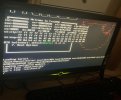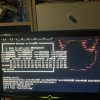Hello,
I've tried to install FreeBSD on an i386 PC, my parents gave me, but when I boot from my USB-Stick the installer starts like normal. After starting Multi- or Single User Mode, it returns following errors:
This PC is an eMaschines EZ1600, has an 32 Bit CPU and 2 GB Ram.
Is this an hardware-related issue or is it solvable?
Thanks!
I've tried to install FreeBSD on an i386 PC, my parents gave me, but when I boot from my USB-Stick the installer starts like normal. After starting Multi- or Single User Mode, it returns following errors:
can't find '/boot/entropy' and can't find '/etc/hostid' in the next line. (I am providing an image in the attached files).This PC is an eMaschines EZ1600, has an 32 Bit CPU and 2 GB Ram.
Is this an hardware-related issue or is it solvable?
Thanks!



